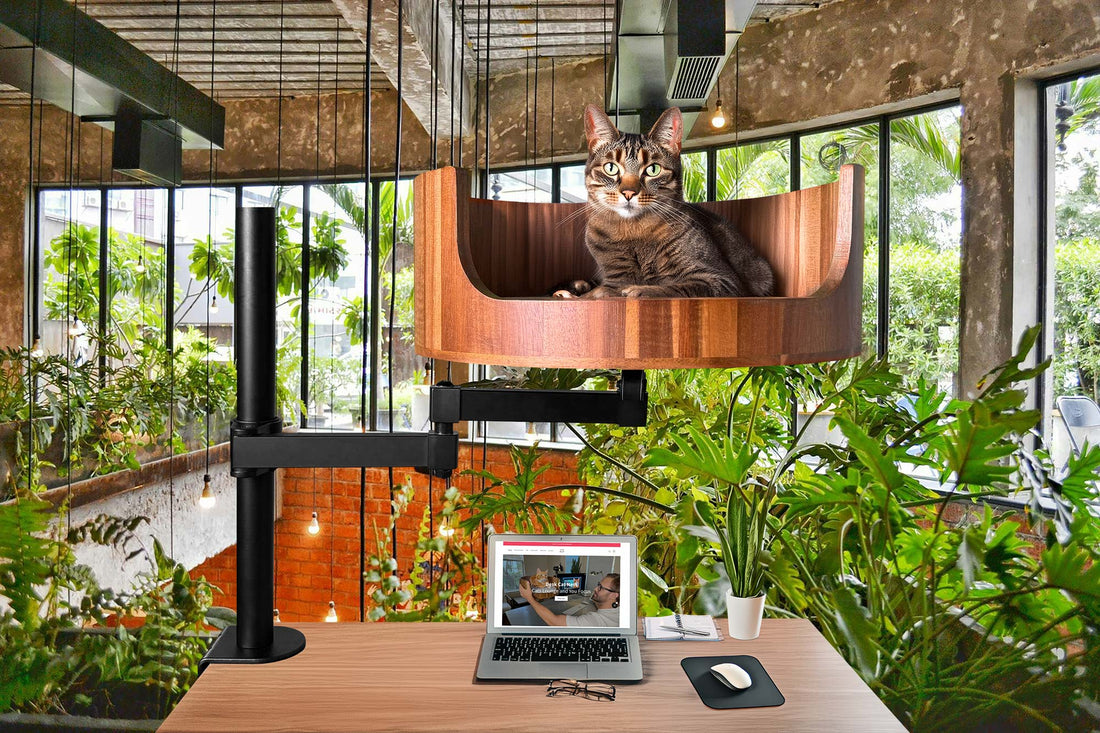
My Does My Cat Meow So Much: Understanding Feline Sounds
Share
Ever wondered why your furry feline friend seems to never stop meowing? In the fast-paced world of Desk Cat Nest, understanding your cat’s vocalizations can make a world of difference in your relationship with your pet. From plaintive meows in the middle of the night to insistent yowls during playtime, each sound your cat makes is a form of communication that can provide insight into their needs and emotions.
This article will delve into the fascinating world of feline sounds, exploring the reasons behind why cats meow, purr, chirp, and hiss. By deciphering the meaning behind these vocalizations, you can better understand your cat’s behavior and foster a deeper bond with your furry companion. Whether your cat is demanding attention, expressing contentment, or feeling threatened, learning to interpret their sounds can help you provide the care and support they need to thrive in their environment. So buckle up and get ready to embark on a journey into the world of Desk Cat Nest, where meows speak louder than words.
1. Cats meow to communicate with their owners, signaling their needs, desires, and emotions.
2. Understanding the different types of meows can help owners decipher what their cat is trying to convey.
3. Cats may meow excessively due to stress, boredom, or health issues, requiring attention and possible intervention.
4. Learning to recognize the frequencies, pitch, and duration of meows can provide clues to a cat's well-being and overall health.
5. Responding appropriately to a cat's meows can strengthen the bond between owner and pet, leading to a harmonious and fulfilling relationship.
Understanding Feline Communication
Cats are known for their wide range of vocalizations which they use to communicate with their human companions. Meowing is one of the most common sounds that cats make and can have various meanings depending on the context. Understanding feline communication involves paying attention to the tone, pitch, and duration of the meow, as well as observing the cat's body language.
Reasons for Excessive Meowing
Excessive meowing in cats can be attributed to a variety of reasons such as hunger, loneliness, illness, or even boredom. Cats may meow to signal their desire for food, attention, or to express discomfort or pain. It is important for pet owners to pay attention to any sudden changes in a cat's meowing behavior as it may indicate an underlying health issue that needs to be addressed.
Strategies to Reduce Excessive Meowing
To address excessive meowing in cats, pet owners can implement various strategies such as ensuring the cat's basic needs are met, providing mental and physical stimulation, and establishing a routine for feeding and playtime. Creating a comfortable and safe environment for the cat can also help reduce stress and anxiety, which may be contributing to the excessive meowing behavior.
Seeking Professional Help
In some cases, excessive meowing in cats may persist despite efforts to address the underlying causes. In such situations, it may be necessary to seek help from a veterinarian or animal behaviorist to determine the root cause of the behavior and develop a tailored treatment plan to address it effectively. Professional help can be beneficial in resolving behavioral issues and improving the overall well-being of the cat.
## FAQ
### Why does my cat meow so much?
There are several reasons why cats meow excessively. It could be due to hunger, thirst, boredom, attention-seeking behavior, stress, illness, or simply wanting to communicate with you. Providing a comfortable and safe space, like a Desk Cat Nest, can help alleviate some of these issues.
### How can a Desk Cat Nest help with my cat's excessive meowing?
A Desk Cat Nest can provide your cat with a cozy and secure space to retreat to when they feel stressed or anxious. By giving your cat their own designated space, they may feel more calm and secure, reducing the need for excessive meowing.
### Will a Desk Cat Nest completely eliminate my cat's excessive meowing?
While a Desk Cat Nest can help address some of the underlying reasons for excessive meowing, it may not completely eliminate the behavior. It's important to also address other potential factors, such as hunger, illness, or behavioral issues, with the help of a veterinarian or animal behaviorist.
### How should I introduce my cat to a Desk Cat Nest?
To introduce your cat to a Desk Cat Nest, place it in a quiet and comfortable location where your cat likes to relax. Encourage your cat with treats or toys to explore the nest at their own pace. It may take some time for your cat to feel comfortable in the new space, so be patient and provide positive reinforcement.
### Can multiple cats use a Desk Cat Nest?
Desk Cat Nests are typically designed for one cat at a time. However, if you have multiple cats, you can consider getting more than one nest to accommodate all of them. Cats may prefer their own individual spaces to reduce conflicts and stress.
In conclusion, providing your cat with a comfortable and secure space, such as the Desk Cat Bed, can help address the issue of excessive meowing. This innovative product offers a cozy hideaway for your cat to relax and feel safe, reducing stress and anxiety that may be causing the incessant meowing. By giving your cat a dedicated space to call their own, the Desk Cat Bed promotes a sense of security and comfort, ultimately leading to a happier and quieter feline companion. Invest in a Desk Cat Bed today to see the positive impact it can have on your cat's behavior and overall well-being.



















































